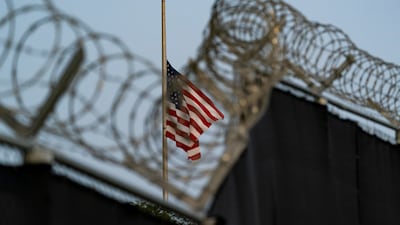Hours after the terrorist attacks on September 11 2001, which killed nearly 3,000 people in New York, Virginia and Pennsylvania, then US president George W Bush reassured his country and the world: “America was targeted for attack because we’re the brightest beacon for freedom and opportunity in the world, and no one will keep that light from shining.”
He also promised an emphatic but just response: “I have directed the full resources of our intelligence and law enforcement communities to find those responsible and bring them to justice.”
That commitment has since shaped the world, particularly the Middle East, though in some ways for the worst. It has brought America some victories, but also many defeats, as the country hastily embarked on missions that undermined human rights norms and international law — areas in which it had long been a historic advocate.
Nowhere were American values undermined more starkly than in Guantanamo Bay, a detention facility on a US naval base in Cuba. The base was ostensibly built to make the US and the world safer. Thanks to its partial repurposing as an opaque prison where dozens were held on murky charges, it manifestly did not. Experts on the facility, such as Hina Shamsi, director of the ACLU’s National Security Project, instead call it "a global symbol of American injustice, torture, and abuse of power”.
Two decades ago today, on January 11, 2002, it received its first detainees. Since then, it has been the extrajudicial, out-of-sight prison for almost 800 men. They were branded "enemy combatants" and stripped of most of their rights as prisoners. It is still open, currently holding 39 inmates. In November, the US heard the first public account of torture at the facility after the September 11 attacks by a detainee, Pakistani citizen Majid Khan. His treatment is not the only instance of illegal practices at “Gitmo”, as the prison is often known, but his case offers an example of the sort of nuance a brutal place such as Guantanamo could never entertain. While he had pled guilty to helping Al Qaeda in 2002, he subsequently rejected terrorism, expressed remorse and said his crimes were committed while vulnerable after the death of his mother. Seven senior US military officials have since backed clemency for him.
Cases such as Mr Khan’s have brought a steady stream of international condemnation, and in recent years there have been hopes Guantanamo would close. Former US president Barack Obama promised to but failed. President Joe Biden pledges the same, but has so far made no meaningful moves.
The biggest reason to close it is not to keep campaign promises and prevent national embarrassment, however. It is to end the this example of America betraying the international rules-based order, painstakingly built up throughout the latter half of the 20th century. It took so long to create and is so precious because it flies in the face of “normal” wartime instincts. History has shown how rare it is to treat enemy combatants, civilians, refugees and prisoners in war with dignity. But after the horror of the Second World War, a diplomatic, multilateral movement led by the US managed to draw up protections to do so.
What took decades to achieve was dashed in months not just at Guantanamo, but also Abu Ghraib, an Iraqi prison where American soldiers degraded and tortured prisoners. Since then, a rising number of countries have reneged on international commitments to protect the most vulnerable. It is worth asking whether so many in the international community would tolerate the conditions and limbo so many refugees find themselves in today if precursors to the breakdown in respect for international law such as Guantanamo had never happened.
And regardless of all the moral arguments against it, there is still the fact that Guantanamo simply did not work. The grimmest irony in the facility’s history is playing out in Afghanistan. A number of its former inmates will be watching today’s anniversary as senior members of the Taliban’s new government in Kabul.
The US, therefore, owes it to the world to act on its promises to close the facility. Two decades on, the case for doing so is only getting stronger.


